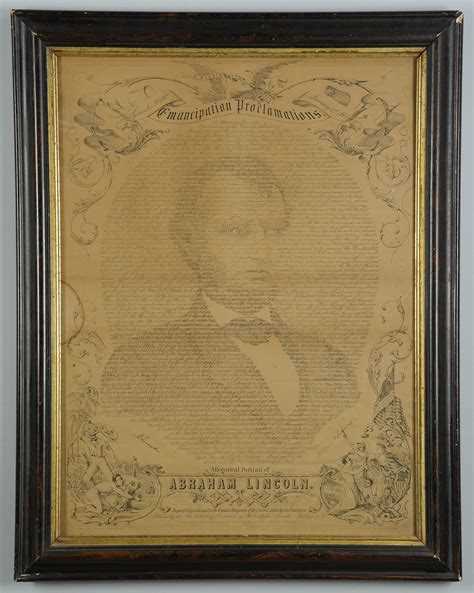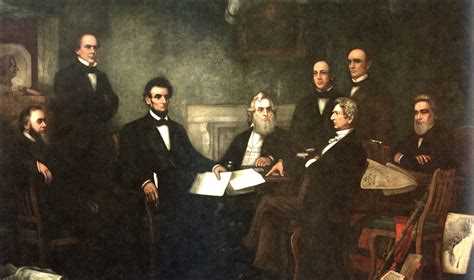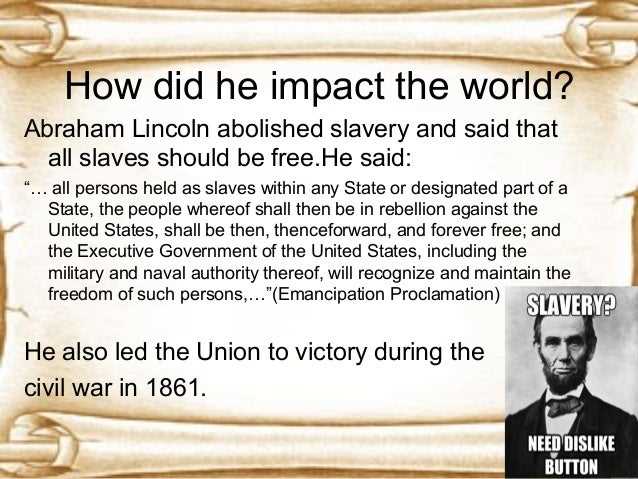
The Emancipation Proclamation, issued by President Abraham Lincoln on January 1, 1863, was a landmark moment in American history. This executive order declared that all enslaved individuals in Confederate territory were to be set free. While it did not immediately end slavery, the Emancipation Proclamation laid the groundwork for the eventual abolition of slavery in the United States.
Lincoln’s decision to issue the Emancipation Proclamation was a pivotal moment in his presidency and in the fight against slavery. As the Civil War raged on, Lincoln recognized the need to redefine the purpose of the war and to use it as an opportunity to address the institution of slavery. By taking a stand against slavery, Lincoln was able to frame the war as a struggle for freedom and equality, which ultimately changed the course of American history.
The Emancipation Proclamation had both immediate and long-term effects on the nation. In the short term, it gave hope to enslaved individuals in Confederate territory, as they saw an opportunity for freedom. It also had important international implications, as it prevented foreign countries from recognizing the Confederacy and providing support. In the long term, the Emancipation Proclamation led to the ratification of the 13th Amendment, which officially abolished slavery in the United States.
Despite its limitations, the Emancipation Proclamation was a crucial step towards the end of slavery and the realization of equality for all Americans. Lincoln’s bold decision to issue this historic document forever changed the course of the nation and paved the way for a more inclusive and just society.
The Emancipation Proclamation
The Emancipation Proclamation was a historic document issued by President Abraham Lincoln on January 1, 1863, during the American Civil War. It declared that all enslaved people in the Confederate states were to be set free. This proclamation had a profound impact on the course of the war and the future of slavery in America.
By issuing the Emancipation Proclamation, Lincoln aimed to weaken the Confederacy by depriving it of its labor force and encouraging enslaved people to escape to Union-held territories. The proclamation also shifted the focus of the war from a conflict over states’ rights to a moral struggle against slavery.
Although the Emancipation Proclamation did not immediately free all enslaved people in America, it paved the way for the eventual abolition of slavery. It demonstrated the federal government’s commitment to ending the institution of slavery and set the stage for the passage of the 13th Amendment to the Constitution, which officially abolished slavery in the United States.
The Emancipation Proclamation also had significant international implications. It prevented European countries, particularly Britain and France, from recognizing the Confederacy as a separate nation and providing it with military support. The proclamation helped to shift public opinion in favor of the Union cause and further isolated the Confederacy on the world stage.
While the Emancipation Proclamation was a major step towards the end of slavery, it did not immediately grant full equality to African Americans. It was not until the passage of the Civil Rights Act of 1866 and the 14th and 15th Amendments to the Constitution that African Americans gained legal rights and protections. Nevertheless, the Emancipation Proclamation marked a pivotal moment in American history and remains a symbol of the ongoing struggle for freedom and equality.
Lincoln’s Decision to Free the Slaves
Abraham Lincoln’s decision to issue the Emancipation Proclamation in 1862 had a profound impact on the institution of slavery in America. This executive order declared that all enslaved people in Confederate territory were to be set free. This decision marked a significant turning point in the Civil War and forever changed the course of American history.
Lincoln’s decision to issue the Emancipation Proclamation was not made lightly. He understood the moral and political implications of such a move, and he weighed the consequences carefully. In the end, Lincoln believed that it was necessary to free the slaves in order to preserve the Union and ensure the ultimate victory of the North.
The Emancipation Proclamation was not an immediate emancipation of all slaves in America. It only applied to Confederate territory that was still in rebellion against the Union. However, it sent a powerful message and had a ripple effect throughout the country. It demonstrated Lincoln’s commitment to ending slavery and set the stage for the eventual passage of the 13th Amendment, which abolished slavery in the United States.
Lincoln’s decision to free the slaves had profound consequences for the African American population. It provided them with hope and a renewed sense of dignity. It also changed the dynamics of the Civil War, as it transformed the conflict from a battle to preserve the Union to a war for emancipation and equality. The Emancipation Proclamation paved the way for the eventual end of slavery and the beginning of the long struggle for civil rights in America.
In conclusion, Lincoln’s decision to issue the Emancipation Proclamation was a pivotal moment in American history. It not only changed the course of the Civil War, but it also had a lasting impact on the institution of slavery and the lives of millions of African Americans. Lincoln’s commitment to ending slavery and his decision to free the slaves set the stage for the eventual abolition of slavery and laid the foundation for the fight for civil rights in America.
The Historical Context

The Emancipation Proclamation was a significant turning point in American history, but it did not come about in a vacuum. To understand the impact of Lincoln’s proclamation, it is important to consider the historical context in which it was issued.
At the time of the Civil War, the United States was deeply divided over the issue of slavery. The Southern states relied heavily on the institution of slavery for their economy, while the Northern states had begun to reject it as morally wrong. This divide led to increasing tensions between the North and the South, which ultimately resulted in the secession of several Southern states and the formation of the Confederacy.
As the war progressed, Lincoln faced the challenge of preserving the Union while also addressing the issue of slavery. He had initially sought to avoid taking a strong stance on the issue, hoping to maintain the support of both Northern and Southern states. However, as the war dragged on and the Union struggled to gain the upper hand, Lincoln recognized the need for a more decisive action.
With the Emancipation Proclamation, Lincoln declared that all slaves in Confederate-held territory were to be set free. This was a bold move, as it fundamentally challenged the institution of slavery and aimed to undermine the economic and social foundation of the Confederacy. However, it is important to note that the proclamation did not actually free all slaves – it only applied to those in Confederate-held territory, not those in Union-controlled areas.
Nonetheless, the Emancipation Proclamation had a profound impact on the course of the war and the future of slavery in America. It helped to shift public opinion in the North and abroad, making it more difficult for the Confederacy to gain diplomatic recognition and support. It also provided a moral justification for the Union’s cause and helped to redefine the goals of the war – from preserving the Union to also ending slavery.
In conclusion, the Emancipation Proclamation was issued in a complex historical context, marked by deep divisions over the issue of slavery. While it did not immediately free all slaves, it was a crucial step towards ending slavery and reshaping the course of American history.
Political Considerations
When Abraham Lincoln issued the Emancipation Proclamation in 1862, he faced several political considerations that influenced his decision-making process. One of the main considerations was the impact the proclamation would have on the Union’s war effort. Lincoln knew that by declaring slaves in Confederate territory free, he would weaken the Confederate economy and potentially cripple their ability to wage war. However, he also understood that this move could alienate the border states that had not seceded from the Union but still allowed slavery.
Another political consideration was the reaction of the Northern Democrats, who were more sympathetic to the Confederacy and opposed to the emancipation of slaves. Lincoln had to carefully navigate these political waters to ensure that he maintained support within his own party and the broader Union. He strategically timed the announcement of the Emancipation Proclamation after a Union victory at the Battle of Antietam, which boosted morale and made the proclamation more palatable to the public.
Furthermore, Lincoln had to consider the international implications of the Emancipation Proclamation. European powers, such as Britain and France, were considering recognizing the Confederacy and potentially intervening in the war. By taking a public stand against slavery, Lincoln hoped to gain moral and political support from these countries and prevent them from siding with the Confederacy. The Emancipation Proclamation served as a powerful statement that the Union was fighting not only to preserve the nation but also to abolish the institution of slavery.
Additionally, Lincoln had to consider the long-term implications of the Emancipation Proclamation on the future of the United States. By declaring slaves in Confederate territory free, Lincoln made it clear that the Union’s goal was the complete abolition of slavery. This declaration would have far-reaching effects on the post-war reconstruction and the eventual passage of the Thirteenth Amendment, which formally abolished slavery throughout the United States.
The Effects of the Emancipation Proclamation
The Emancipation Proclamation, issued by President Abraham Lincoln on January 1, 1863, had profound effects on the United States and the institution of slavery. This executive order declared that all slaves in Confederate territory were to be set free, and it changed the course of the Civil War and the future of the nation.
One of the most significant effects of the Emancipation Proclamation was the shifting focus of the Civil War. While the war initially began as a fight to preserve the Union, Lincoln’s proclamation made it clear that ending slavery was now a central goal. This shifted the perception of the war, both domestically and internationally, as a moral struggle to abolish an oppressive institution. The proclamation also encouraged enslaved individuals to escape to Union lines, further weakening the Confederacy and strengthening the Union’s cause.
The Emancipation Proclamation also had lasting effects on the African American population. While it did not immediately grant them full rights and equality, it marked a significant step towards the abolishment of slavery and the eventual emancipation of all slaves in the United States. The proclamation paved the way for the 13th Amendment to the Constitution, which officially abolished slavery in 1865.
Additionally, the Emancipation Proclamation had diplomatic implications. By declaring that all slaves in Confederate territory were free, it sent a message to foreign nations, such as Britain and France, that the Union was fighting for a just cause. This made it more difficult for these countries to provide support to the Confederacy and potentially led to a shift in international opinion in favor of the Union.
While the Emancipation Proclamation did not immediately bring an end to slavery or grant full rights to African Americans, its effects were far-reaching and played a crucial role in shaping the future of the United States. Lincoln’s actions through this proclamation set the stage for the eventual end of slavery and the ongoing fight for civil rights and equality in America.
The Struggle for Freedom

The struggle for freedom has been a central theme in American history, with various groups fighting for their rights and liberation from oppression. One of the most significant struggles in this regard was the fight against slavery, which lasted for centuries and culminated in the Emancipation Proclamation.
Slavery was deeply rooted in the fabric of American society, with millions of African Americans held in bondage and treated as property. They endured unimaginable hardships, forced labor, and the denial of basic human rights. However, a growing movement for abolition began to gain momentum in the early 19th century, led by courageous individuals and activists who believed in the equality of all people.
The struggle for freedom reached its peak during the Civil War, a bitter conflict that pitted the Northern states against the Southern states. The issue of slavery was at the heart of this war, as the North sought to preserve the Union and abolish the institution of slavery, while the South fought to maintain their way of life and the economic system built on the backs of enslaved people.
President Abraham Lincoln played a pivotal role in this struggle for freedom. With the Emancipation Proclamation, he declared that all slaves in Confederate territory were to be set free, effectively changing the course of the war and providing a moral justification for the Union’s cause. Although the Emancipation Proclamation did not immediately free all slaves, it marked a turning point in the fight against slavery and set the stage for the eventual passage of the 13th Amendment, which formally abolished slavery in the United States.
The struggle for freedom did not end with the Emancipation Proclamation or the abolition of slavery. African Americans continued to face discrimination and inequality in the years that followed, leading to further movements for civil rights and equal treatment. However, the Emancipation Proclamation remains a symbol of hope and progress, a testament to the enduring spirit of those who fought for freedom and justice.
Redefining the Meaning of Citizenship
The Emancipation Proclamation, issued by President Abraham Lincoln on January 1, 1863, played a significant role in redefining the meaning of citizenship in the United States. Prior to the proclamation, African Americans were not considered equal citizens and were denied basic rights and freedoms. However, with the proclamation, Lincoln declared that all slaves in Confederate territory were to be set free, effectively challenging the notion that citizenship was exclusive to white Americans.
By emancipating the slaves, Lincoln transformed the concept of citizenship by recognizing the inherent humanity and rights of African Americans. This act acknowledged that citizenship should be based on principles of equality and liberty, regardless of race or color. It challenged the prevailing belief that citizenship was solely for those of European descent and paved the way for future civil rights movements.
Furthermore, the Emancipation Proclamation empowered African Americans to claim their rights as citizens and actively participate in shaping the nation’s future. It provided them with a newfound sense of agency and the ability to advocate for their own rights. This redefined the meaning of citizenship as an active, participatory role in society, rather than a passive status granted by the government.
Additionally, the proclamation had a ripple effect on American society, sparking conversations and debates about the true meaning of citizenship. It forced Americans to confront their own prejudices and question the foundations of their beliefs. It also highlighted the importance of inclusivity and equality in a democratic society.
In conclusion, the Emancipation Proclamation redefined the meaning of citizenship in the United States by recognizing the humanity and rights of African Americans, empowering them to claim their rights and participate in shaping the nation’s future, and sparking conversations about equality and inclusivity. It was a pivotal moment in American history that laid the groundwork for the ongoing struggle for civil rights and equality.
Legacy and Impact
The Emancipation Proclamation, issued by President Abraham Lincoln in 1862, had a profound and lasting impact on the United States, both during Lincoln’s presidency and in the years that followed. This landmark document declared that all slaves in Confederate territory were to be set free, effectively changing the course of the Civil War and the future of slavery in America.
Lincoln’s Emancipation Proclamation marked a turning point in the fight against slavery and has been widely regarded as one of the most significant measures taken by any American president. Its impact on the outcome of the Civil War cannot be overstated, as it helped to shift the moral and political landscape of the nation.
One of the key legacies of the Emancipation Proclamation was that it made the abolition of slavery a central goal of the Union’s war effort. By framing the issue of slavery as a moral imperative, Lincoln transformed the war from a conflict primarily about preserving the Union into a struggle for human freedom. This shift in focus galvanized support for the Union cause and helped to create a sense of purpose and determination among the troops.
Moreover, the Emancipation Proclamation laid the foundation for the eventual passage of the 13th Amendment to the Constitution, which formally abolished slavery throughout the entire United States. Although the Proclamation itself only applied to Confederate territory, its symbolic significance and moral force played a crucial role in shaping public opinion and paving the way for the permanent eradication of slavery.
The legacy of Lincoln’s Emancipation Proclamation extends beyond the abolition of slavery. It also had a profound impact on the rights and aspirations of African Americans. The Proclamation provided a rallying cry for the black community, inspiring many to join the Union Army and fight for their own freedom. It also set the stage for the Civil Rights Movement of the 20th century, as it highlighted the power of government action in advancing the cause of racial equality.
In conclusion, Lincoln’s Emancipation Proclamation left an indelible mark on American history. Its legacy and impact can still be felt today, as it helped to shape the nation’s understanding of freedom, equality, and justice. The Proclamation’s role in ending slavery and inspiring future generations to fight for their rights makes it one of the most important documents in American history.